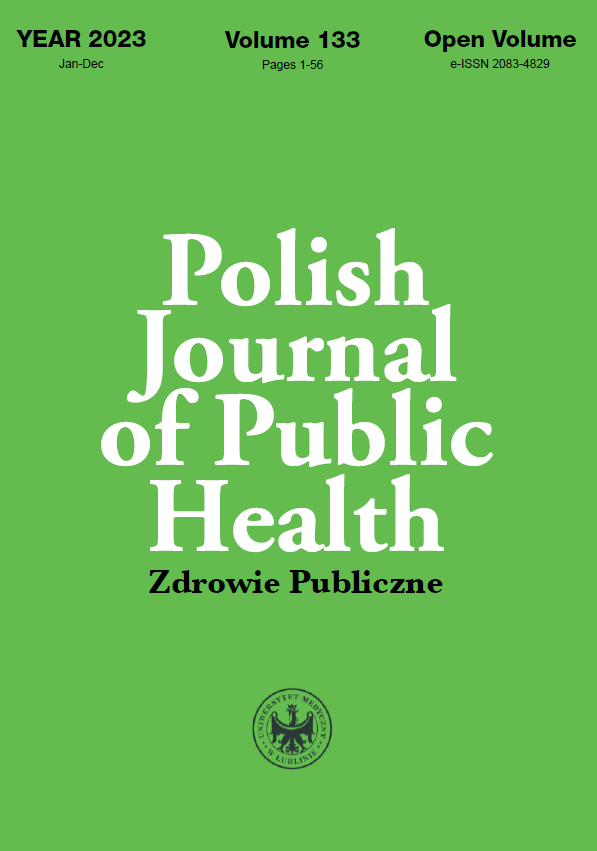Quality of life after COVID-19 in Polish patients
DOI:
https://doi.org/10.12923/2083-4829/2023-0011Keywords:
COVID-19, quality of life, patientsAbstract
The pandemic is a new, surprising situation that shows the quality of life in a completely different dimension. Studies show that the quality of life of people infected with SARSCov2 has signifi cantly decreased both psychologically and physically. Covid 19 disease caused by coronavirus SARS-CoV-2 has been shown to be a complex pathogenic disease with high mortality rates, especially in the elderly, but many serious cases and deaths occurred in young people. The aim of the study was to investigate whether COVID 19 disease signifi cantly affects the quality of life of those affected. The method used for online diagnostics was the EQ-5D-3L Quality of Life Questionnaire and a modifi ed BAT questionnaire. Studies have shown that the quality of life of the respondents was at an average level. Pain/discomfort and anxiety/depression were the most frequently indicated domains. A statistically signifi cant strong relationship between the demographic variables age, gender and morbidity and quality of life after the disease was shown. Similarly, the effects of hospital stays and concomitant illnesses affecting quality of life were investigated. The results can feed into medical practice, therapy, education and therapy of mental health, and the applied research model can be considered useful and useful to continue research.
References
1. World Health Organization. [https://www.who.int] (access: 23.09.2022).
2. Flisiak R, Horban A, Jaroszewicz J, et al. Management of SARS-CoV-2 infection: recommendations of the Polish Association of Epidemiologists and Infectiologists as of March 31, 2020. Pol Arch Intern Med. 2020;132(3): 352-7.
3. Dzieciątkowski T, Szarpak L, Filipiak KJ, et al. COVID-19 challenge for modern medicine. Cardiol J. 2020;27:175-83.
4. Hu B, Guo H, Zhou P, et al Characteristics of SARS-CoV-2 and COVID-19. Nat Rev Microbiol. 2021;19:141-54.
5. Chippa V, Aleem A, Anjum F. Post-acute coronavirus (COVID-19) syndrome. StatPearls; 2022. p. 21-4.
6. Carvalho-Schneider C, Laurent E, Lemaignen A, et al. Follow-up of adults with non-critical COVID-19 two months after symptoms’ onset Clin Microbiol Infect. 2021;27 (2):258-63.
7. Gordon EH, Reid N, How frail is frail? A systematic scoping review and synthesis of high impact studies, BMC Geriatr. 2021;21:199.
8. Armstrong RA, Kane AD, Cook TM. Outcomes from intensive care in patients with COVID-19: a systematic review and meta-analysis of observational studies. Anaesthesia. 2020;2,31-3.
9. Nilsson S. Effect of COVID-19 on health-related quality of life in adolescents and children. Int J Environ Res Public Health. 202;18:4563.
10. Vindegaard N, Benros ME. COVID-19 pandemic and mental health consequences: Systematic review of the current evidence. Brain Behav Immun. 2020;89:531-42.
11. Chen K-Y, Li T, Gong F, et al. Predictors of health-related quality of life and influencing factors for COVID-19 patients, a follow-up at one month. Front Psychiatry. 2020;11:668.
12. World Health Organization. [https://www.who.int] (access: 23.09.2022).
13. Bhaskaran K, Rentsch CT, Hickman G, et al., Overall and cause-specific hospitalisation and death after COVID-19 hospitalisation in England: A cohort study using linked primary care, secondary care, and death registration data in the OpenSAFELY platform. PLoS Med. 2021;19 (1):21-3.
14. Gujski, M, Jankowski M, Rabczenko D, et al. Characteristics and clinical outcomes of 116,539 patients hospitalized with COVID-19 – Poland, March-December 2020. Viruses. 2021;13:1458.
15. Qu G, Zhen Q, Wang W, et al. Health-related quality of life of COVID-19 patients after discharge: A multicenter follow-up study. J Clin Nurs.2021;30:1742-50.
16. Kathirvel N. Post COVID-19 pandemic mental health challenges. Asian J Psychiatr. 2020;53:102430.
17. Carenzo L, Protti A, Dalla Corte F, et al. Short-term health-related quality of life, physical function and psychological consequences of severe COVID-19. Ann Intensive Care. 2021;11(1):1-8.
18. Badinlou F, Lundgren T, Jansson-Fröjmark M. Mental health outcomes following COVID-19 infection: impacts of post-COVID impairments and fatigue on depression, anxiety, and insomnia – a web survey in Sweden. BMC Psychiatry. 2022;22:743.
19. AlRasheed MM, Al-Aqeel S, Aboheimed GI, et al. Quality of life, fatigue, and physical symptoms post-COVID-19 condition: A cross-sectional comparative study. Healthcare (Basel). 2023:5;11(11):1660.
20. Lemhöfer C, Sturm, C, Loudovici-Krug D, et al. Quality of life and ability to work of patients with Post-COVID syndrome in relation to the number of existing symptoms and the duration since infection up to 12 months: a cross-sectional study. Qual Life Res. 2023;32:1991-2002.
21. Nandasena HMRKG, Pathirathna ML, Atapattu AMMP, et al. Quality of life of COVID 19 patients after discharge: Systematic review. PLoS ONE. 2022;17(2):e0263941.
Downloads
Published
Issue
Section
License
Copyright (c) 2024 Authors

This work is licensed under a Creative Commons Attribution-NonCommercial-NoDerivatives 3.0 Unported License.


